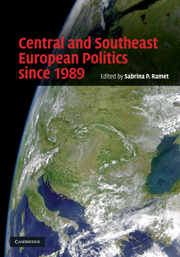Book contents
- Frontmatter
- Contents
- List of figures and maps
- List of tables
- Notes on the contributors
- Preface
- List of acronyms and abbreviations
- Guide to pronunciation of Central and Southeast European words
- 1 Central and Southeastern Europe, 1989
- 2 Central and Southeastern Europe, 2009
- Part 1 Introduction
- 1 Introduction
- 2 Post-socialist models of rule in Central and Southeastern Europe
- Part 2 Issues
- Part 3 Central Europe
- Part 4 Yugoslav Successor States
- Part 5 Southeastern Europe
- Part 6 Former Soviet republics
- Part 7 Present and future challenges
- Index
- References
2 - Post-socialist models of rule in Central and Southeastern Europe
Published online by Cambridge University Press: 05 June 2012
- Frontmatter
- Contents
- List of figures and maps
- List of tables
- Notes on the contributors
- Preface
- List of acronyms and abbreviations
- Guide to pronunciation of Central and Southeast European words
- 1 Central and Southeastern Europe, 1989
- 2 Central and Southeastern Europe, 2009
- Part 1 Introduction
- 1 Introduction
- 2 Post-socialist models of rule in Central and Southeastern Europe
- Part 2 Issues
- Part 3 Central Europe
- Part 4 Yugoslav Successor States
- Part 5 Southeastern Europe
- Part 6 Former Soviet republics
- Part 7 Present and future challenges
- Index
- References
Summary
Throughout the Russian and East European area, the collapse of the communist organizational monopoly and system of rule in the course of 1989–91 raised huge expectations which could not always be fulfilled. There were dreams of overnight prosperity, if not of wealth, of national reawakening, of religious freedom, of the chance to travel. There was also a general and speedy repudiation of the communist past which affected almost all of the countries of the region in one way or the other – all, indeed, except Romania, Serbia, and Montenegro, and even here, the communists survived in power only by redesigning themselves as reformers (as per Ion Iliescu of Romania) or as nationalists (in the cases of Slobodan Milošević and Momir Bulatović of Serbia and Montenegro, respectively). It was a sign of the times that many of those elected as presidents had served time in jail or detention – among them, Lech Wałęsa (Poland), Václav Havel (Czechoslovakia), Franjo Tudjman (Croatia), Alija Izetbegović (Bosnia-Herzegovina), and Zheliu Zhelev (Bulgaria) – and that the biggest controversy in those societies that did not go to war usually centered on the question of which privatization scheme to adopt. But by the mid-1990s, there was growing disenchantment with the new elites who were seen variously as too naïve or too nationalistic or too inexperienced or as simply not effective.
- Type
- Chapter
- Information
- Central and Southeast European Politics since 1989 , pp. 9 - 36Publisher: Cambridge University PressPrint publication year: 2010
References
- 4
- Cited by



